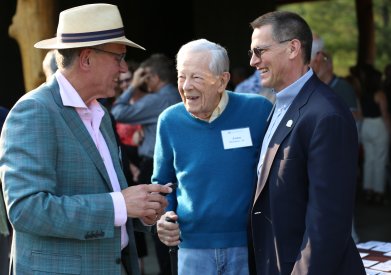A Choosing Wisely Story: Respectful and Trusting Conversations
May 20, 2019
While recruiting specialty societies to the Choosing Wisely campaign about six years ago, I attended a board meeting of a surgical specialty society. I had flown to Chicago to meet with the society’s board as it considered whether to join the campaign. The one question board members had for me was: What happens when a specialty society doesn’t agree with a recommendation put forth by another specialty society – how do you resolve this disagreement? When they received my response, they seemed startled. I told them that we have respectful conversations between the societies involved. Perhaps needless to say, the board decided not to join at the time (but did so subsequently).
I also explained that we didn’t have contracts with specialty societies and instead used credit card pioneer Dee Hock’s method, described in the book The Birth of the Chaordic Age, of agreeing to operating principles. In founding the credit system that became VISA International, member banks agreed to a set of principles. Once you agreed, you were in; once you didn’t agree, you were no longer participating. There were no legal agreements, just trusting relationships built on a set of common principles and expectations.
Our four operating principles for specialty societies to use in creating their Choosing Wisely recommendations were (and are):
- The tests and treatments addressed should be frequently done and/or costly;
- Recommendations should be evidence based;
- Tests and treatments should be within the control of the specialty society making the recommendation; and,
- Societies should transparently report the process they used to create their recommendations.
We trusted the competencies of the specialty societies to provide relevant recommendations. This didn’t go over well with the aforementioned specialty society because of the lack of formal legal contracts. The adage of needing control when you don’t have trust comes to mind.
Conflicts between specialty societies about recommendations have arisen three or four times in the seven years of the campaign. With more than 80 specialty societies being invited to comment on recommendations before they are published, it is inevitable there would be some different viewpoints on new recommendations.
One conflict arose earlier this year. The leaders and staff of the society making the recommendations were on a conference call with their counterparts from the “opposing” society. Tensions were high and the implications of the screening recommendation were equally high. Both sides were given time to explain their position, and I served as a mediator of a sort. Ground rules were provided and a respectful conversation ensued. Like other discussions we have had in the past, the resolution was to add a sentence stating that the recommendation pertained only to asymptomatic patients. Both sides felt like they were heard, and all felt good about the resolution.
What does this tell us about building trust?
- Structuring conversations with some simple rules allows people to be heard
- A third party sometimes is helpful in anchoring difficult conversations
- We should always assume good intentions
- Permitting each side to appreciate the other’s viewpoint is important
- Conversations like these are trust builders and have a healing effect
- Reliance on the competencies of experts builds trust
With over 600 Choosing Wisely recommendations, we have had a small number of conversations over conflicts, and they have all worked without a legal system intervening and without a contract. We have simply relied on trusting conversations among very well-intentioned people – as it should be.

Daniel B. Wolfson
EVP & COO, ABIM Foundation


